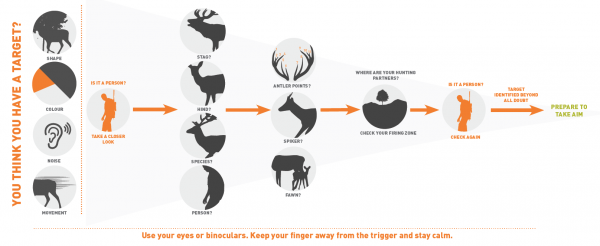Night hunting covers all types of hunting during the hours of darkness (30 minutes after sunset to 30 minutes before sunrise). All night hunting is prohibited on Public Conservation (DOC) Land but is common on private property when culling or doing other types of pest control. It’s important to know the best practice for hunting at night to ensure a safe and successful hunt.
Top things to consider for night hunting:
- Always identify your target using white light.
- Thermal imaging equipment should only be used to find targets, not to identify the target.
- Know your firing zones.
- Follow safe firearm handling guidelines.
- Always know where everybody is.
- Supervise unlicensed hunters.
- Visit the area in daylight first.
On Public Conservation Land, or DOC, land the following activities are strictly prohibited:
- Hunting or discharging a firearm during the hours of darkness (half an hour after sunset to half hour before sunrise).
- Hunting or discharging a firearm that has thermal imaging equipment attached.
- Hunting with thermal imaging equipment that can be clipped onto the firearm.
- Hunting with spotlights, torches, night vision equipment, vehicle headlights, or any other artificial light source.
Make a Plan and Stick to it
The planning you do before you leave home will make all the difference when you are out on a night hunt.
- Get your hunting party involved in making a plan, so that you are all on the same page when you set off.
- Choose a hunting trip that suits the skills and fitness of everyone in your group.
- Visit the area in daylight before your night hunt so you know the lay of the land.
Find out more about planning a hunt here.
On Your Night Hunt
- Always identify your target beyond a doubt as your game species before firing. The best way to do this is by using white light. Find out more about identifying your target here.
- Thermal imaging equipment should only be used to find the target, not to identify it. To identify your target, use white light.
- Know your firing zone. It is your responsibility to know where every bullet you fire could go.
- Put firearm safety first. Point your firearm in a safe direction, especially when crossing difficult terrain. Always know the load state of your firearm.
- Help others see you by wearing blaze gear. This will make you visible to other hunters.
- Communicate with everyone in your group when making decisions, and make sure everybody agrees on the plan.
- Choose one shooter in your group. Reduce the risk of misidentifying a target by having one person shoot at a time. About 80% of mis-identified target incidents are from the same hunting party.
- Supervise unlicensed hunters in your group at all times.

What to Do Next
Continue your preparation with our online resources, there is still plenty to learn to ensure for a safe and enjoyable hunt.
Explore Our Resources
- Get the skills | in Navigation, River Safety and more essentials in our Skills Section
- Watch our Hunting Videos | Learn the 7 Basic Firearms Safety Rules and many more useful tips
- Read our manuals | Access the NZ Bushcraft Manual, NZ Firearm Handbook and other digitised resources here
- Hunting Activity Guide | Read our online guidebook to learn how to apply the 7 Basic Firearms Safety Rules. In English and Te Reo Māori
- Department of Conservation Website | Learn about where you can hunt and more about the species you are trying to target on their website
- NZ Police Website | Learn how to get your NZ Firearms Licence.